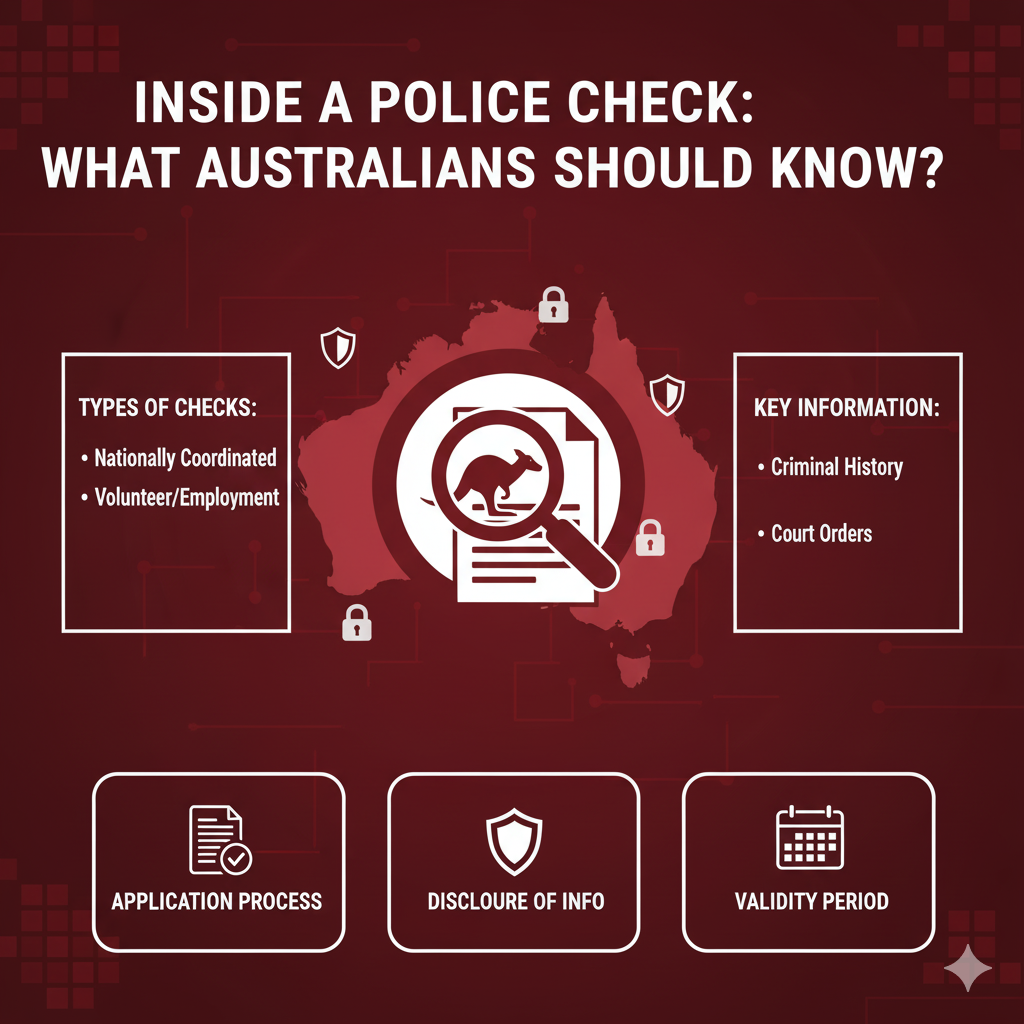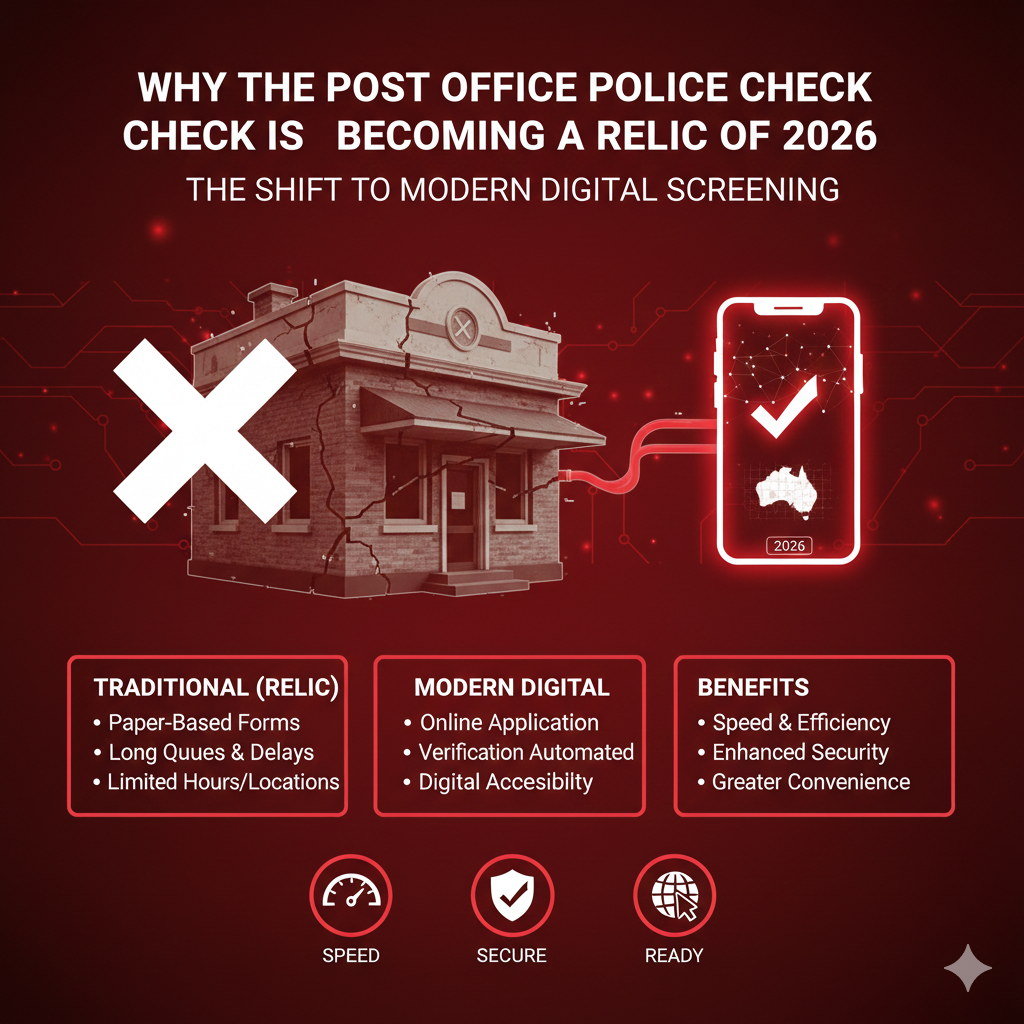Applying for a job, volunteer role, or accreditation in Australia? Learn why a Nationally Coordinated Criminal History Check, or police check, is required.
It’s natural to feel anxious about this process, particularly if you have a history of brushes with the law. The biggest question on everyone’s mind is: what comes up on a police check Australia? Will every past mistake be revealed, or are certain details protected?
The answer is nuanced. A police check is not a blanket release of every single interaction you’ve had with law enforcement. It’s an official document that discloses specific court outcomes, governed by strict national and state based legislation.
As an ACIC accredited provider, Rapid Screening offers a fast, secure, and clear process for obtaining your NCCHC. Here is a comprehensive breakdown of exactly what comes up on a police check Australia and what is intentionally excluded.
Understanding the Two Possible Results of a Police Check
When your application is processed, the certificate returned will generally contain one of two results:
No Disclosable Court Outcomes (NDCO)
An NDCO means that either:
- No police information was found to be held against you.
- Police information was found, but due to the application of the relevant state or territory’s Spent Convictions Scheme or other information release policies, it cannot be disclosed for the stated purpose of the check.
An NDCO is what most employers and licensing bodies look for.
Disclosable Court Outcomes (DCO)
A DCO means that police information was found and can be released based on the purpose of your check and the relevant legislation. This is the section that details your criminal history.
The Core Information: What Comes Up on a Police Check Australia?
When a check results in a DCO, the following types of information are generally released. Importantly, this information is collected from the databases of all Australian police agencies across every state and territory.
Disclosable Court Outcomes (DCOs)
The certificate will detail an offender’s history, which can include:
- Convictions and findings of guilt recorded by an Australian court.
- Court appearances where a charge was proven.
- The nature of the offence, the sentencing date, and the penalty imposed (e.g., fine, community service, term of imprisonment).
- Good Behaviour Bonds and other court orders (for the duration of the bond).
- Charges laid by police that are still pending a final court hearing.
- Certain traffic offences that have resulted in a court conviction (e.g., drink driving).
- Children’s Court convictions and findings of guilt (subject to state specific youth justice and spent convictions legislation).
The “Point in Time” Check
It’s vital to remember that an NCCHC is a point in time check. This means the result is accurate only up to the specific date and time the check was issued. It does not reflect any charges or convictions that may occur after the certificate is printed.
Crucial Exemptions: What Doesn’t Come Up on a Police Check Australia?
Australian legislation recognises the importance of rehabilitation and limits the disclosure of less serious, older offences. Several types of information are generally excluded from an NCCHC.
The Spent Convictions Scheme
The most significant exclusion is the Spent Convictions Scheme. This is a legislative framework, operating at both the Commonwealth and state/territory levels, designed to prevent discrimination against individuals with minor, old criminal records.
How a Conviction Becomes ‘Spent’:
For a conviction to be considered ‘spent’ and therefore non disclosable, it must generally meet conditions such as:
- A specified crime free period has passed (often 10 years for adults, 5 years for juveniles).
- The individual was not sentenced to a term of imprisonment exceeding 30 months.
- The conviction does not relate to a serious sexual offence.
Once a conviction is spent, you are legally entitled to act as though the conviction never occurred, and it will not appear on a standard police check.
Spent Conviction Exceptions
However, there are exceptions. Spent convictions may still be disclosed if the check is for specific high risk purposes, such as:
- Working with children (Working with Children Check).
- Working with vulnerable people (e.g., aged care, disability support).
- Applying for certain government security clearances or licences (e.g., firearms, private security).
Other Excluded Information
In most cases, an NCCHC in Australia will not disclose the following details:
- Infringement Notices: Standard police fines, such as minor traffic fines or on the spot fines, which were not contested or did not result in a court conviction.
- Charges that were Withdrawn, Dismissed, or Acquitted: If a charge was dropped, or you were found Not Guilty in court.
- Cautions, Warnings, and Diversionary Programs: Formal cautions or warnings issued by police, or participation in a court ordered diversion program that resulted in no recorded conviction.
- Non Police Prosecuted Matters: Civil disputes, family law matters, or professional disciplinary proceedings that were not handled by a statutory law enforcement agency.
- Overseas Convictions: Criminal history from foreign countries. A separate International Criminal History Check is required to obtain this information.
How Employers Interpret Your DCO
If your check results in a DCO, the ultimate decision on your suitability for the role rests with the employer or licensing body. They are required to assess the information disclosed based on the principles of relevance and proportionality.
A Disclosable Court Outcome doesn’t automatically mean disqualification. They will typically consider:
- Relevance to the Role: Does the offence relate to the duties of the job? (e.g., a theft conviction for a finance role vs. a minor traffic offence for a desk job).
- Nature and Severity: Was it a serious offence, or a minor, one off incident?
- Time Elapsed: How long ago did the offence occur? A DCO from 15 years ago is generally viewed differently than one from last month.
- Applicant’s Explanation: You will typically be given an opportunity to explain the circumstances of the DCO.
Conclusion
Knowing what comes up on a police check Australia empowers you to apply with confidence. The Nationally Coordinated Criminal History Check is a targeted document that serves to protect the community by only revealing Disclosable Court Outcomes (DCOs) and even those are strictly limited by Spent Convictions Schemes. Minor infringements and cleared charges are, in most cases, left off the record, giving reformed individuals a genuine fresh start.
Rapid Screening makes getting your official NCCHC simple. Our accredited online process is quick, secure, and provides you with the verified certificate you need, often within hours.
Frequently Asked Questions (FAQs)
1. How far back does a police check go?
A police check officially searches your entire criminal history across Australia. However, due to Spent Convictions Schemes, information about convictions that occurred long ago and meet certain criteria (usually 10 crime free years for an adult offence) will be excluded from disclosure on the certificate.
2. Will my old traffic fines appear on the check?
No, standard traffic fines or infringement notices (e.g., parking fines, minor speeding tickets) that were paid and did not result in a court conviction will not appear on your police check. Only serious traffic offences that led to a court appearance and a conviction (such as drunk driving or reckless driving) are generally disclosed.
3. Can I still get a job with a Disclosable Court Outcome (DCO)?
Yes, absolutely. A DCO does not automatically disqualify you from employment. The employer must assess the relevance of the offence to the job you are applying for. Many people with old or minor convictions are successfully employed.
4. What’s the difference between a National Police Check and a Working with Children Check (WWCC)?
A National Police Check is a point in time check for general employment. A Working with Children Check (WWCC) is a clearance specifically for child related work and includes continuous monitoring over the clearance period (e.g., 5 years in NSW). If you need a WWCC, you must apply for it separately through the relevant state authority.
5. Can I dispute a Disclosable Court Outcome if I think it’s wrong?
Yes. If you receive a certificate with a DCO that you believe is incorrect, you have the right to dispute the record. You should contact the organisation that processed your check (like Rapid Screening) immediately, who will guide you through the formal dispute process with the Australian Criminal Intelligence Commission (ACIC) and the relevant police agency.




